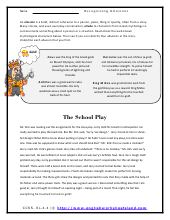What are Context Words and Phrases?
Authors of different types of texts often have to use difficult words to support their writing. In order to let the readers understand the meaning of it without looking in the dictionary, the author often provides clues that can be used to guess the meaning. These clues are also called context words and phrases.
Types of Context Words and Phrases
Synonyms
One of the major types of context words is a synonym. Synonyms mean words that have similar meanings. When you are reading a text, you will often come across a difficult or unfamiliar word. You might get stuck for a moment, but only a little further, a synonym for that word might appear. This is the technique of the author to lead you the meaning of that word.
For example,
"The annual fete is happening next month. It is such a fun party to go to."
Antonyms
Another form of context words are antonyms. An antonym is the opposite of a synonym. These are words that have completely opposite meanings to each other. The author will often put antonyms nearby a difficult word so that the meaning of it can be guessed easily. Antonyms are identified by contrasting phrases.
For example,
"No that did not happen in reality. I was only speaking figuratively."
Definition
Definitions are context phrases that literally define the difficult or unfamiliar word. These definitions are phrases that clear the confusion about the word. They contain the meaning and explanation for that word.
For example,
"You call a car's truck boot in England."
Explanation
Explanations are also context phrases that clear out the meaning of a difficult or unfamiliar word. Explanations are not definitions rather they describe and explain the context of the word. Explanations can be easily spotted in any text.
For example,
"Don't worry that is not a gigantic mosquito, it is a crane fly."
Determining Word Meanings from Context Phrases
Not all of us keep a dictionary by our side at all times while we are reading something. It is also practically impossible to know the meaning of each and every word while you are reading a lengthy text in the English language. Under such circumstances, understanding the meaning of a newly encountered word sometimes becomes necessary for the reader to understand the meaning of the complete sentence.
In case of the unavailability of a dictionary by your side, you can always look for clues and hints that can describe word meanings to you easily. These clues are hidden in the same sentences and phrases where that new or unknown word is located. Here are some of the elements to look up so you can understand the meaning of words from context phrases easily and in no time:
Look for Roots and Affixes of the Word
Sometimes, a word that is seemingly new to you might have been encountered by you in parts many times before. There is a chance that the new word is simply a compound word formed by joining the well-known affixes and roots together. It is better to first breakdown the word and try to see if you can identify the individual elements of the word like its affixes or roots. This can make the word's meaning clear to you in many cases.
Look for Synonyms and Antonyms
The author might have written the synonym or antonym of that unknown word in the same phrase. All you have to do is to read the phrase carefully and work the meanings out.
Look for Examples
The same phrase or sentence that has the difficult and unknown word might have one or two examples for it as well. These examples can make the meaning of that word clear to some extent.
How to use Context to Infer the Meaning of a Phrase?
To infer the meaning of a word or a phrase means to use your prior knowledge or information to guess what you do not know. Smart readers prefer to make the right inferences from the phrases to enjoy their reading and learning more. To make inferences about the meaning of phrase, using the information in its context is a very helpful method. Context is a combination of words and sentences surrounding the phrase to be inferred.
Given below are some techniques that will help one to infer the meaning of phrase with the help of its context:
Explaining Clues in The Context
Most of the times, the context of a phrase is fully explaining its meaning. Therefore, one must read and re-read the context of a phrase carefully till he or she is able to grab some clues that will help him or her to infer the meaning of that phrase.
Explaining Synonyms in Context
Sometimes, if a phrase is hard or contains some difficult words, its context can easily help inferring its meaning. In many cases, context contains a synonym of the hard words in the phrase or even the whole phrase. In the case of a synonym present in the context, it gets very easy to infer the meaning of the phrase.
Explaining Antonyms in Context
Just like the synonyms, the context of a phrase might also contain the antonymous meanings to it. In this case, you only have to identify and understand the antonymous idea and this will lead you to the meaning of the whole phrase.
Explaining Appositives in Context
Apposition in the context is when two phrases are placed side by side. In other words, the second phrase serves to define the phrase to be inferred differently. This apposition in context can help to infer the meaning of a phrase.

